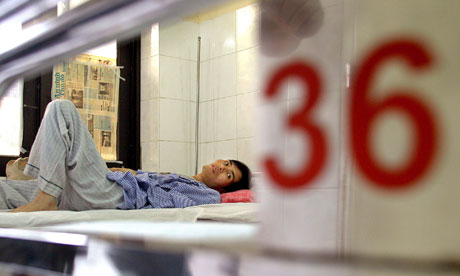Overall spending by DfiD on HIV/Aids between now and 2015 will decrease by 32% by 2015 – from £59.9m to £41m.
The funding will drop by nearly 85% in Asia (from £13m to £2m) and 17% in Africa (from £46.9m to £39m).
The drop in support comes despite a 92% rise in Britain's bilateral aid for global health, from £376m to £723m by 2015, when reproductive, maternal and newborn health will absorb 64% of DfID's global health funding.
By contrast, the share of funding for HIV and Aids will drop from 16% in 2010/2011 to under 6% in 2014/2015.
Analysis is based on published country-level budgets from DfiD. Figures for India, Yemen, and Malawi have yet to be published.
It is seven months since the release of the UK aid reviews, which will re-focus British funding on fewer developing countries.
Despite the drop in bilateral funding, the department said it was not reducing its efforts against HIV/Aids.
"It is wrong to say we are reducing our commitment to tackling Aids and HIV," said a DfID spokesperson. "Through both multilateral and bilateral support Britain will reduce new HIV infections by at least 500,000 among women in Africa, will support 268,000 HIV positive people with treatment and 37,000 women with treatment to prevent transmission to their babies."
Dfid said the figures cited were only part of the picture, and that overall spending, which included support for multilateral organisations, was not finalised.
Overall, Britain contributes much more through multilateral channels on HIV/Aids and other diseases. In 2010 the UK donated £579.3m towards fighting HIV/Aids bilaterally and multilaterally through bodies such UNAids and the Global Fund to Fight Aids, Tuberculosis and Malaria.
The decrease in bilateral spending on HIV/Aids was indicative of a shift away from targeting specific diseases, to a strengthening of health systems in general, experts said.
"DfID may be planning to address the bilateral decrease in HIV/Aids spending through an increase in funding for multilateral initiatives such as the Global Fund," said Aaron Oxley, executive director of Results UK, an anti-poverty group. "Despite the Global Fund having received the highest possible rating in the multilateral aid review, no new funds have yet been pledged by the UK government. We would like to see this addressed as a matter of some urgency, sending a strong signal of commitment and support for the fight against all three diseases."
Oxley added that DfID had a good reputation for its bilateral aid, and the cuts in HIV/Aids funding would affect high-quality programmes.
"Every time, they cut, it will hurt," he said. "It needs to be carefully managed."
International HIV/Aids Alliance, a global partnership of nearly 40 organisations, also expressed concern at the DfID cuts. "As the detail of these plans becomes clearer there are worrying indications that HIV funding may be dropped completely in some places where it is really needed. The alliance will be monitoring whether funding for HIV reaches those in need, and will work closely with DfID to ensure that key HIV work does not go unfunded, particularly where that work is meant to be funded under other DfID sector budgets in-country."
DfID said it would not fund any further work on HIV/Aids for the Caribbean. "Although the region has the second highest prevalence rate in the world, this sector is well served by other donors," the department said.
For Kenya, DfID would phase out part of its HIV and Aids support programme next year. Funding for Burma would drop to £1m from £6m. Aids funding for Vietnam, currently at £7m, would be phased out.
The analysis of DfID's projected global health funding follows the release of a report from UNAids and the US-based Kaiser Family Foundation, which found that HIV and Aids funding from 15 of the world's largest donors fell in 2010 for the first time in a decade.
The fall in funding from 2009 to 2010 was largely driven by a reduction in disbursements from the US, the single largest donor for HIV and Aids programmes in developing countries. While Washington appropriated about $5.5bn for Aids in both 2009 and 2010, disbursements dropped from $4.4bn in 2009 to $3.7bn in 2010.
In 2009, approximately 370,000 children were born with HIV - almost all of them in low- and middle-income countries, mainly in sub-Saharan Africa. Since the beginning of the epidemic 30 years ago, more than 60 million people have been infected with HIV and nearly 30 million people have died of HIV-related causes.
• This article was amended on 5 October 2011. The original referred to the International HIV/Aids Alliance as a UK group. This has now been changed.

but is to be phased out altogether. Photograph: Kham/Reuters
